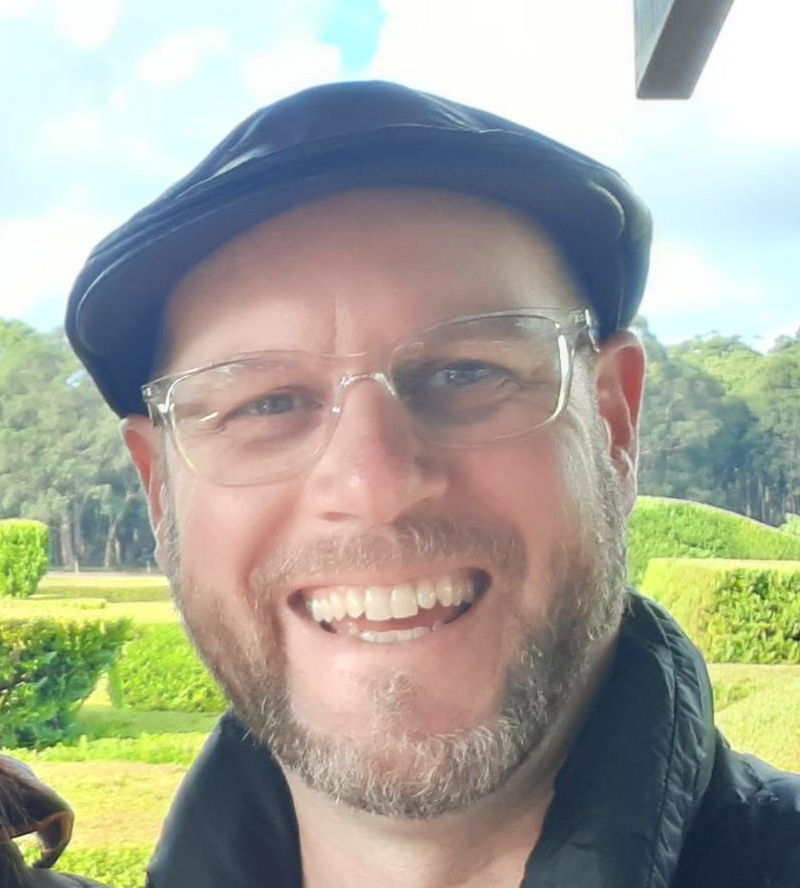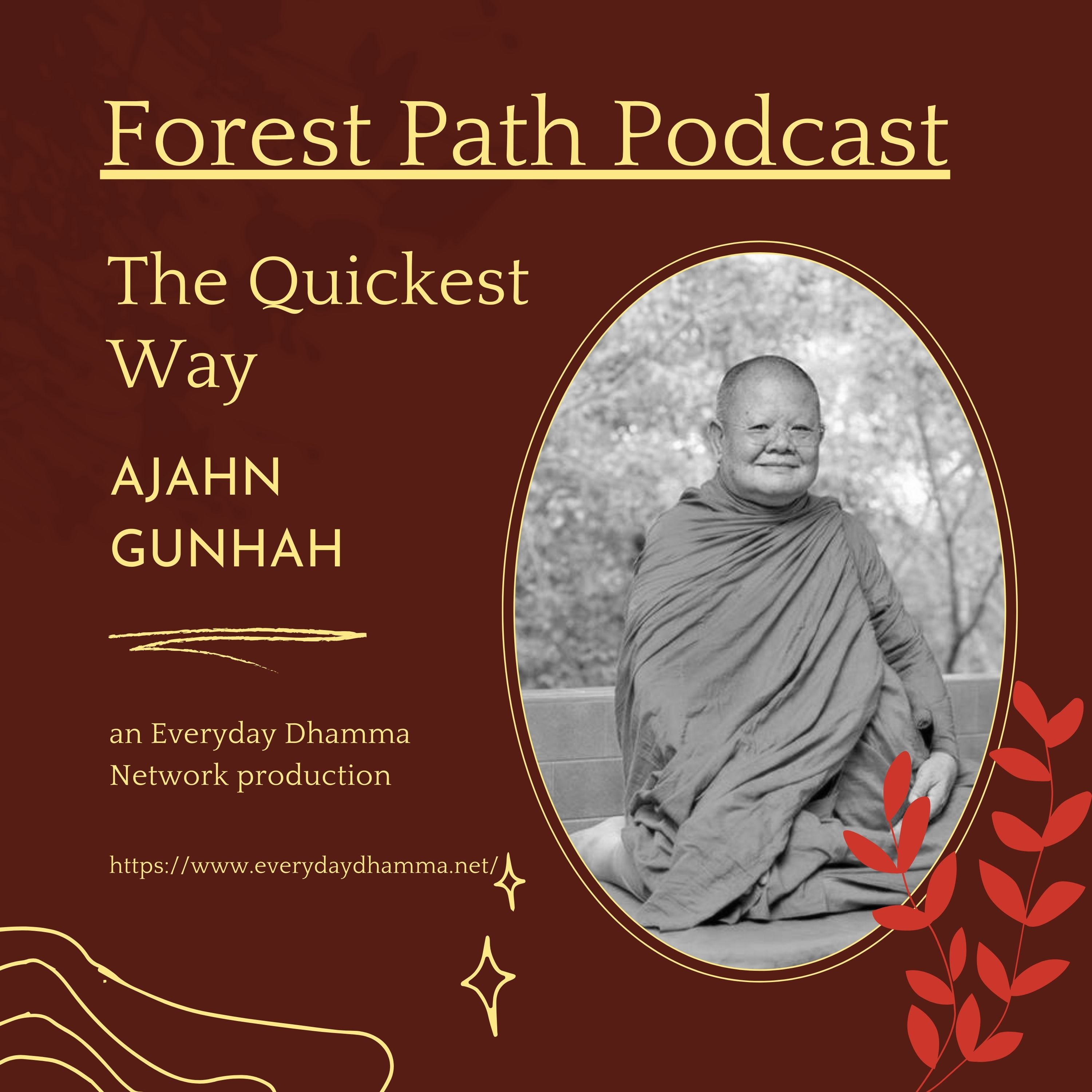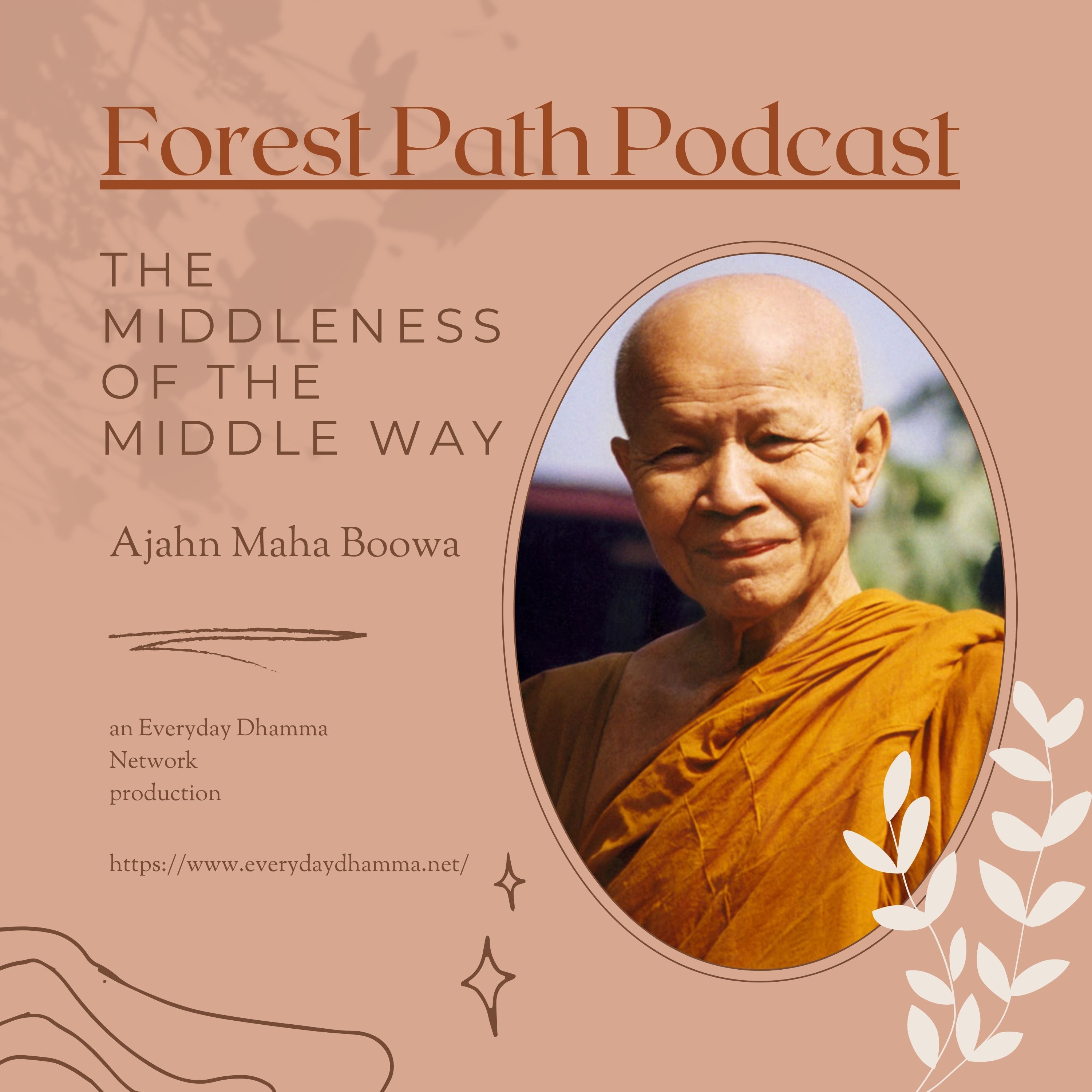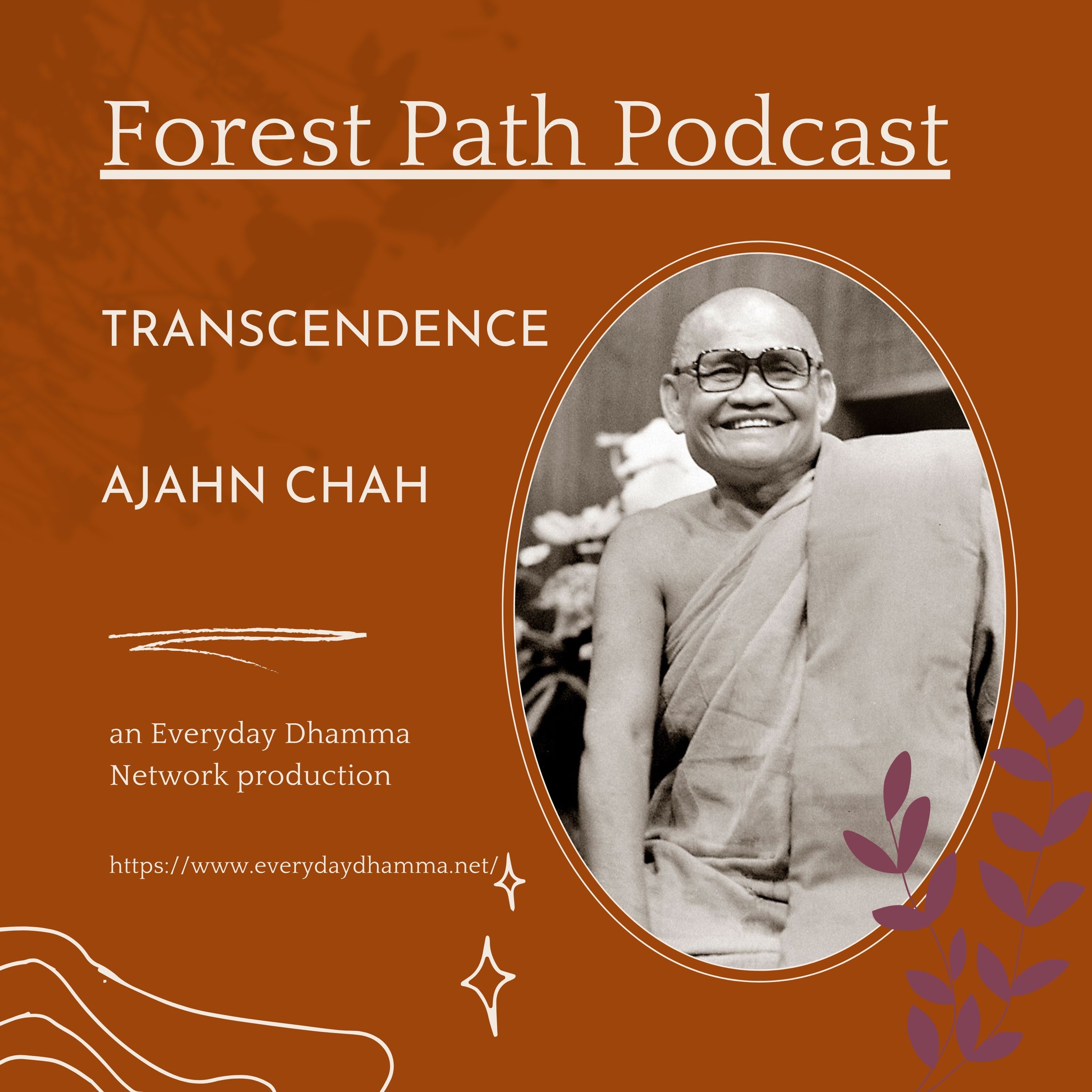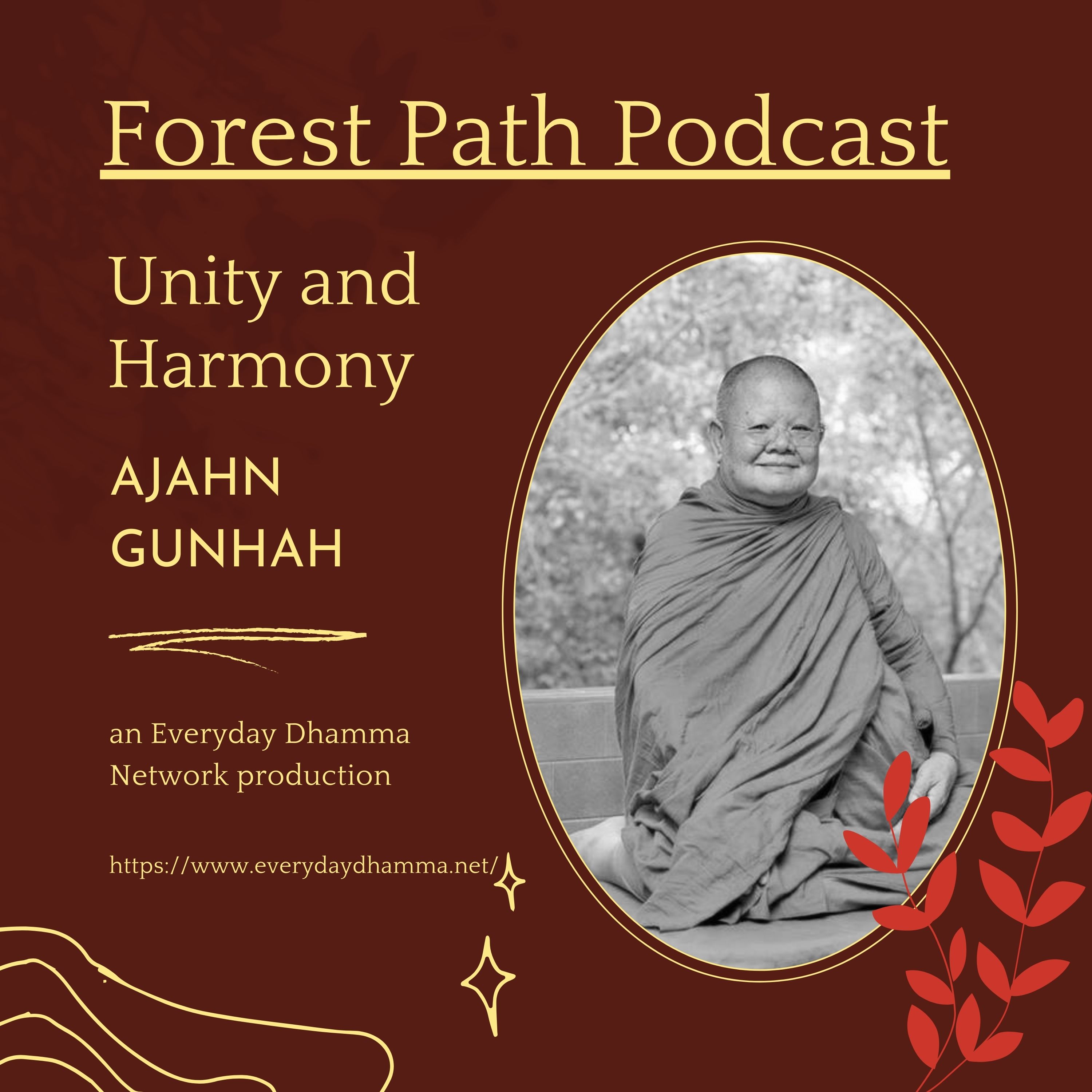Episode Transcript
[00:00:00] Welcome to the Forest Path Podcast, a podcast sharing the teachings of awakened meditation masters of the modern era. This episode is a series of quotes attributed to Ajahn Gah.
[00:00:12] It's titled the Quickest Way and has been translated by Ajahn Jnana Dhamo as this is a series of quotes rather than a Dhamma talk. There will be a brief two or three second pause between each quote.
[00:00:26] This is so that you can distinguish that a new quote is coming up and perhaps also for you to pause the audio and reflect upon the point being made by the previous quote.
[00:00:37] May you all benefit from hearing this gift of Dhamma by Meditation master of the Thai Forest tradition.
[00:00:51] The Quickest Way by Ajahn Sukakkamo Having taken up birth in this life, we cultivate goodness and spiritual qualities so that we may bring an end to rebirth.
[00:01:07] This is achieved by giving up self view.
[00:01:11] All practice comes down to the present moment.
[00:01:17] We take this body made up of flesh and bones that is subject to death and use it as a vehicle for goodness.
[00:01:30] If we stop breathing, we will die.
[00:01:34] If we stop doing acts of kindness, we will die from all goodness.
[00:01:42] Keep reminding yourself that you might only live for another day and night and strive now to do good deeds.
[00:01:52] When we are standing, walking, sitting or lying down, we must endeavour to be a good person, to be selfless and motivated by that goodness.
[00:02:05] There are already many smart, clever and rich people, but good people are hard to find. Good people are are those who hold principles of virtue and thoughtfulness.
[00:02:19] What is religion?
[00:02:22] Religion means selflessness and renunciation. If a person is unselfish and gives to others, he or she can be said to have a religion with no doubt in the Buddha, Dhamma and Sangha Wholeheartedly devote your life to Dhamma practice with absolute commitment to the Buddha.
[00:02:47] The Dhamma of the Buddha is practical. We must put it into practice and develop ourselves so we can grow in goodness.
[00:02:58] Buddhists who see harm in the cycle of birth and death will take refuge in the Buddha. What are the qualities of a Buddha?
[00:03:06] Virtue, concentration and wisdom.
[00:03:12] The wise recommend that we follow the Buddha's teachings in order to be called one who travels well or one who goes well.
[00:03:24] Sometimes the idea of enlightenment seems so far away and the more we read about it, the further it seems. But if we turn inward and return to the now, then it feels closer and gets easier and we will know the way to easily extinguish all suffering.
[00:03:45] Studying the external world is endless. The study of the Buddha's teachings has an end Purpose to end the cycle of birth and death.
[00:03:58] Therefore, be firmly committed to the triple refuge, the Buddha, Dhamma and Sangha, then this life will be blessed. Following the fully Enlightened One and all those enlightened disciples who have reached the same eternal bliss and happiness.
[00:04:17] Some people who wish for enlightenment don't want to take up the training or keep the precepts. If they think like this, then they are already off the path. There are no shortcuts. The quickest way is by virtue and selflessness.
[00:04:36] Adhere to virtue and practice daily. Devote your life to the Buddha and the truth will be your measure at death.
[00:04:46] Adhere to the five Precepts and practice virtue without being disheartened. Do not look down upon morality, but practice it wholeheartedly. Give it a hundred percent, just like all the enlightened ones have done.
[00:05:03] If we keep our precepts purely, then concentration will be purified. The Buddha taught virtue for living in the world and the higher virtues for enlightenment. These higher virtues are the aim of Buddhism.
[00:05:19] We must go against the stream of our desires with patience and perseverance, submitting to the training and the discipline of the Buddha, which is the highest and most supreme. We should be willing even to sacrifice our lives, because if we don't submit to the practice, the practice will be a mere philosophy.
[00:05:41] If one can keep the 5, 8, 10, or 227 precepts purely and unblemished, then one is called a Blessed One or the one who sees the Dhamma.
[00:05:56] The Buddha taught us how to make the mind relaxed by breathing in and out comfortably. It is not our task to make it calm or excited. It is our duty to just breathe in and out comfortably. It is not for us to control or manage the mind or stand in the way of birth, old age, sickness, death, praise and blame. We are obliged only to breathe in and out with ease and peace.
[00:06:26] Reflect on how the Buddha put his mind at ease. Then incline your own mind to that same relaxed, calm state.
[00:06:35] Allow your mind to be cool and calm, cheerful and joyful. Let your mind smile internally and be happy with mindfulness and clear comprehension in in a comfortable way.
[00:06:50] When we close our eyes, we cannot see who is coming or going. It's only when we open our eyes fully that we see clearly. Having our eyes open means here having mindfulness and clear comprehension. Keeping the mind in the present moment relaxed and at ease.
[00:07:12] We should not look to the future, but let go in this present moment. Let go profoundly and completely.
[00:07:23] If your mind stays in the present moment, you can solve Problems all day long.
[00:07:29] When we resolve these problems, wisdom will also arise continuously.
[00:07:37] Make the mind completely empty for one or two minutes. This will be of immeasurable benefit and merit. This is a way to practice for enlightenment.
[00:07:52] Contemplate repeatedly on birth, old age, sickness, death and not self. Our struggle is to understand the freedom that arises from seeing non self.
[00:08:05] The starting point for the destruction of the cycle of birth and death is to contemplate the body until one becomes very skilled at it. This is the most important and essential work of the mind.
[00:08:20] The first bond of existence is personality belief. We must strive to eliminate this bond by knowing and clearly penetrating trouble. The truth of suffering because in reality, there is only suffering that arises, suffering that persists, and suffering that passes. Apart from that, there is nothing else. There is nothing but this suffering.
[00:08:46] Perceive everything as a fake, a deceit, a mirage flickering in the wind that comes and goes.
[00:08:54] Our tendency is to run after that mirage, floating on the breeze, chasing after meaningless experiences that are endless suffering.
[00:09:05] See the danger and harm in this endless cycle of birth and death, just as a poor person sees the pain in poverty.
[00:09:15] We must contemplate this body thoroughly until every single organ and part of this body is manifest and clear in our mind.
[00:09:24] Meditate and contemplate until our mind reaches a base of peace.
[00:09:29] The Buddha and our teachers taught us this way.
[00:09:35] True wisdom grows from tranquility and clear mindfulness in the present and can extinguish suffering in every moment.
[00:09:46] Pleasure only appears as such because we imagine it that way. Pain only appears so because we imagine it as such.
[00:09:58] In reality, there is nothing. It is only thinking and proliferation of the mind.
[00:10:06] Effort must be made today.
[00:10:09] Do not let the time and opportunity be wasted, because this life of ours is blessed.
[00:10:17] The type of ordination which yields great merit and great fruit is that which is dedicated to Dhamma practice.
[00:10:25] Whatever and however the Buddha taught us, that is how we practice. In this way, we discard the self and take up the ways of the Buddha.
[00:10:37] Follow the Buddha's advice. Practice well, practice straight, practice, practice rightly and practice properly. How long one has been ordained as a monk or nun is insignificant.
[00:10:52] Real Dhamma practice is not actually to let go of anything or to hold on. It's neither to progress or regress. Because this Dhamma practice we do is not like we read about in the books.
[00:11:05] The path of Dhamma practice is not like traveling forward or backwards or even stopping anywhere, but it is just abiding in virtue, peace and wisdom.
[00:11:18] Our practice must be established around duties and activities in the present, this will be the vehicle to peace.
[00:11:28] If we do not earnestly practice Dhamma, we will not gain satisfactory results.
[00:11:34] What we gain may not be able to compensate for what we lose.
[00:11:38] But if we set our mind to it, we would surely make profit. Everyone must do it on his her own. It is a job for each individual, like eating or breathing.
[00:11:52] We must practice to be attentive of the real conditions of reality, here and now, in every physical posture. Because the mind has no posture, only the body.
[00:12:02] It's in the present moment that we should possess virtue, concentration and wisdom.
[00:12:10] We need to practice at any moment, anywhere, anytime, no matter what, as if we have no other choice.
[00:12:20] To climb a mountain takes effort. To cross the ocean takes hardship. To conquer the mental hindrances, one faces them straight.
[00:12:32] It's out of compassion that we train in this way. If it wasn't for compassion, beings would be left to their own devices. So it is because of compassion that we have this strict, disciplined training to make us strong.
[00:12:48] We must be firm, patient and endure.
[00:12:52] How much do we endure? We endure to the point where if we have to die, then so be it.
[00:13:01] All the Enlightened Ones teach us that we should die before death.
[00:13:06] This means that the defilements of the mind should die before we do.
[00:13:12] In meditation, we must first hold in the mind the word buddho in all bodily postures. If instead we skip this step and go directly to an insight development, our mind will not have a firm foundation.
[00:13:27] Consequently, wisdom meditation through insight will not be as effective as it should be or or it will not work at all and it may instead lead to agitation and worry.
[00:13:38] This is thinking meditation, not insight meditation. Since it is just speculation or imagination. We misunderstood and wrongly believe that we attain insight.
[00:13:53] Being human is a dignified state, though if we do not attentively practice Dhamma, life will be no different from being dead. Because we have died from developing the virtue of the noble ones.
[00:14:07] Every person must strive to remove the bond and attachments of suffering. Dhamma practice must be like this.
[00:14:26] That concludes the Dhamma teaching the Quickest Way by the Venerable Ajahn Kahnhar. I've gone ahead with this episode, even though it isn't a conventional Dhamma talk. Because I really wanted to do a teaching by Ajahn Kahnha and this is all I can access. If you know of any other English translations of Ajahn Gah teachings, please let me know by emailing me at.everydaydhammastmail.
[00:14:52] the forest bath Podcast is part of the Everyday Dhamma Network. If you go to the everydaydhamma.net homepage, you will discover more about the three other podcasts on the network. Also, this podcast is produced and narrated by Solhana. If you like these audio resources that I'm making available in a free, convenient podcast format, you may want to become a supporter by going to the Everyday Dhamma Network and clicking onto the Ko Fi link on that down the bottom left of that page. There are links in the description below.
[00:15:25] Thank you for listening. May you all experience insight and PE.
